2015 Hyundai Genesis Review
Price Range: $9,500 - $20,990
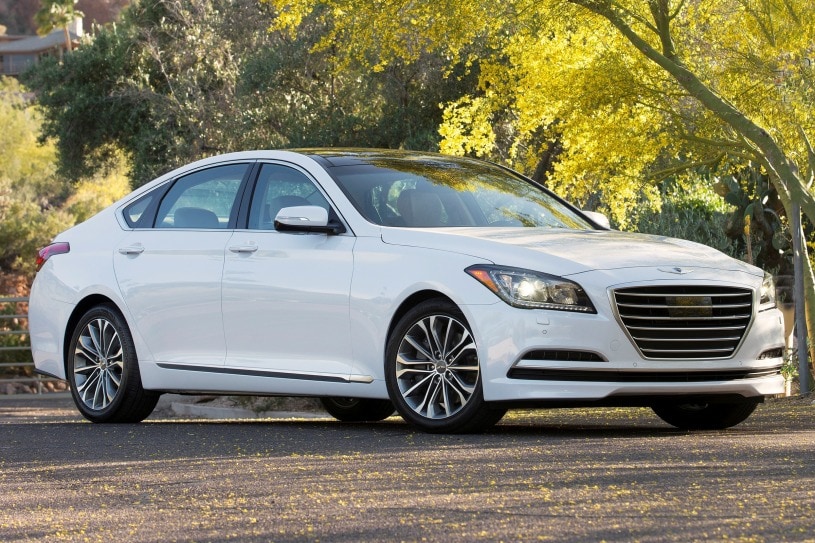 View 154 more photos
View 154 more photos View 154 more photos
View 154 more photos View 154 more photos
View 154 more photos View 154 more photos
View 154 more photos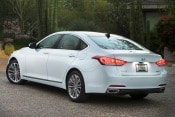 View 154 more photos
View 154 more photos+150
Edmunds' Expert Review
by the Edmunds Experts
Pros
- Exceptional value
- smooth ride quality
- roomy and high-quality interior
- excellent crash test scores
- long warranty coverage.
Cons
- Rear seat headroom is a little tight for this class.
What’s new
The Genesis has been completely redesigned for 2015.
Edmunds says
The Hyundai Genesis has always offered plenty of features at a very agreeable price. But this year's redesigned 2015 Genesis has all that, plus the quality interior and overall refinement it was missing previously. It's a top choice for a luxury sedan.
For sale near Des Moines, IA
19 listings
- $11,977good price$1,422 below market
- 130,085 miles
- No accidents, 3 owners, personal use only
- 16 City / 25 Hwy MPG
- C & S Hyundai (87 mi away)
- AWD/4WD
- Back-up camera
- Bluetooth
- Navigation
- Leather Seats
Close
Located in Waterloo, IA
AutoCheck Vehicle History Summary
Accident Free Vehicle: Yes
Personal Use Only: Yes
History Provider: AutoCheck
Title Details: Clean Title
Salvage Vehicle: No
Frame Damage: No
Theft History: No
Lemon Status: No
Free History Report: No
Features and Specs:
19 Combined MPG (16 City/25 Highway)
Listing Information:
VIN: KMHGN4JE0FU024071
Stock: FGS1725A
Certified Pre-Owned: No
Listed since: 06-29-2025 - $10,850good price$2,138 below market
- 89,939 miles
- 1 accident, 2 owners, corporate fleet vehicle
- 18 City / 29 Hwy MPG
- Auto Connection (88 mi away)
- Back-up camera
- Bluetooth
- Navigation
- Leather Seats
- Power Driver Seat
Close
Located in Waterloo, IA
AutoCheck Vehicle History Summary
Accident Free Vehicle: No
Personal Use Only: No
History Provider: AutoCheck
Title Details: Clean Title
Salvage Vehicle: No
Frame Damage: No
Theft History: No
Lemon Status: No
Free History Report: No
Features and Specs:
22 Combined MPG (18 City/29 Highway)
Listing Information:
VIN: KMHGN4JE1FU100235
Stock: 100235
Certified Pre-Owned: No
Listed since: 03-28-2025
Vehicle overview
Since its debut in 2009, Hyundai's Genesis has been one of the most sensible choices available for a luxury sedan. While lacking the completely polished and prestigious form of some European sedans, the Genesis has typically more than made up for it with a very desirable blend of features and power for the money. For its fully redesigned 2015 Genesis, Hyundai hopes to cement the model's place among the traditional choices without relying solely on the value proposition.
The 2015 Genesis is built on a new rear-wheel-drive platform. Overall length is pretty much the same, but the wheelbase is about 3 inches longer, which primarily translates into even more legroom for rear passengers. The 2015 Genesis also gets a comprehensive interior update with revised center stack and center console layouts, a larger navigation display and more dash curves. The dial-and-button media controller in the center console is retained. It's not the most original execution, but along with increased seat comfort and a reshaped steering wheel, it puts the Genesis on par with the luxury intangibles offered by its German and Japanese rivals.
The existing 311-horsepower 3.8-liter V6 and 420-hp 5.0-liter V8 engines carry over and continue to send power through an eight-speed automatic transmission. New all-wheel-drive availability (V6 only) should make the sedan more appealing to shoppers in the snowbelt. And while the Genesis is not a particularly sporty sedan, an optional driver-adjustable Sport mode alters transmission, steering and suspension settings for more responsive and aggressive driving when the mood strikes.
Hyundai has seen to it that the new Genesis is still an impressive bargain. The base 2015 Genesis 3.8 costs thousands less than the entry-level Cadillac CTS, for instance. You'll pay even more to get an Audi A6 or a Lexus GS 350. The pricing gap grows even wider when you start comparing the V8-powered Genesis to an equally equipped BMW 5 Series or Mercedes-Benz E-Class. Of course, these are all fantastic cars and you won't go wrong with any of them. Yet the 2015 Hyundai Genesis is a serious luxury sedan in its own right, serious enough that its lack of a decades-long pedigree shouldn't keep you from seeing it as an equal to the premium-car establishment.
Performance & mpg
The 2015 Hyundai Genesis 3.8 comes with a 3.8-liter V6 generating 311 hp and 293 pound-feet of torque. The transmission is an eight-speed automatic. The V6-powered Genesis comes standard with rear-wheel drive, but can be fitted with optional all-wheel drive.
The EPA's estimated fuel economy for the rear-drive Genesis 3.8 is 22 mpg combined (18 city/29 highway). Selecting all-wheel drive drops that to 19 mpg combined (16/25).
The Hyundai Genesis 5.0 has a 5.0-liter V8 engine that produces 420 hp and 383 lb-ft of torque. Estimated fuel economy is 18 mpg combined (15/23).
At the Edmunds test track, a Genesis 3.8 AWD sprinted from zero to 60 mph in 6.6 seconds, while the V8-powered version performed the same test in a very quick 5.3 seconds. Both times are impressive for a fairly large sedan.
Safety
The 2015 Hyundai Genesis comes standard with antilock brakes, traction and stability control, active front head restraints, front and rear side airbags, full-length side curtain airbags and a driver's knee airbag. Also standard is Hyundai's Blue Link 2.0 connectivity suite, which features automatic crash notification, an SOS button, on-demand roadside assistance, remote door unlocking and remote start, geo-fencing (allowing owners to set limits for teenage drivers), stolen vehicle slow-down/immobilization/recovery and turn-by-turn navigation.
Blind-spot detection and rear cross-traffic alert are optional for the Genesis 3.8 in the Signature package and standard for the Genesis 5.0. Optional through the 3.8's Tech package and standard on the 5.0 are lane-departure warning and a lane-keeping assist system, adaptive cruise control, front and rear parking sensors and an automatic emergency braking system that can reduce the severity of collisions or potentially prevent lower-speed collisions.
During Edmunds brake testing, a Genesis 3.8 AWD came to a stop from 60 mph in just 109 feet while the Genesis 5.0 took 112 feet, both excellent performances.
In government crash tests, the Hyundai Genesis five-star overall rating, along with five-star ratings for its performance in frontal- and side-impact crash tests. The Insurance Institute for Highway Safety awarded the 2015 Genesis the best possible rating of "Good" in its moderate-overlap frontal offset, small-overlap frontal offset, side-impact and roof strength tests. The Genesis' seatbelts and head restraints also received a "Good" rating for their whiplash protection in rear impacts.
Driving
The 2015 Genesis isn't a sport sedan, even with its optional adjustable suspension and engine and transmission control parameters set to "sport." But most drivers should still be quite happy with the way it drives. Around turns it responds precisely to steering inputs and has adequate grip for a sedan of its size. More importantly, the ride quality is excellent -- this is one relaxing way to get down the road, as you'll be hard-pressed to hear wind whoosh, tire whine or engine noise.
Both engines feel pretty strong when it comes to acceleration. Although the V8 model clearly has more low-end punch, it doesn't feel appreciably faster than the V6 in normal day-to-day driving. In fact, the only reason we can see to get the 5.0 over the 3.8 is if you really feel the need to tell people that you sprung for the V8.
Interior
An all-new body and chassis for the 2015 Genesis brings an almost 3-inch increase in wheelbase, giving it a significant bump in legroom for those in the rear seats. Despite all its stretch-out room, headroom in the rear seat remains at a bit of a premium, one of the only criticisms we can level at this palpably high-class cabin.
Hyundai designers took a minimalist approach to the dashboard and center console, and we like how it brings a distinct airiness to the cabin. The center stack and center console are not overwrought with buttons, controls or busy shapes. There's everything you need, but it's never in your way and never cluttering. We particularly like the simplicity and straightforward operation of the rotary-dial input for the optional, upgraded navigation system.
The cabin is further improved by better materials on the dash, doors and seats for 2015. Before, the Genesis wasn't quite up to the class leaders in this area. This is no longer, as there's nary a visible interior piece or panel that has even a whiff of cost-cutting. The gauges are clear and concise and free from extraneous and distracting details, although you can, of course, dial up all manner of extra information if you desire. Even the base Genesis comes with appealing leather for the seats and steering wheel, and the standard navigation system and its 7-inch screen is more than acceptable. Capping it off is a meticulous level of assembly: Every panel and piece inside the Genesis fits with intense precision that matches just about any premium sedan you'd care to compare from Germany or Japan.
Like the cabin, the 2015 Genesis' trunk is expansive, even if its actual volume, at 15.3 cubic feet, is slightly reduced from the previous generation.
2015 Hyundai Genesis models
The 2015 Hyundai Genesis is a full-size, rear-wheel-drive luxury sedan available in 3.8 (V6) and 5.0 (V8) models, with all-wheel drive as an option for the Genesis 3.8. There is a Genesis coupe, but it's a very different vehicle and is covered in a separate review.
Standard features for the Genesis 3.8 include 18-inch alloy wheels, automatic headlights, a rearview camera, heated mirrors, automatic wipers, cruise control, automatic climate control, keyless ignition and entry, heated eight-way power front seats with four-way power lumbar, leather upholstery, a tilt-and-telescoping steering wheel, an auto-dimming rearview mirror, a touchscreen interface, a navigation system, real-time traffic, Bluetooth phone and audio connectivity, Hyundai's Blue Link emergency telematics system, and a seven-speaker audio system with a CD player, an auxiliary audio jack, a USB/iPod interface, HD radio and satellite radio.
The Genesis 3.8 can be equipped with three option packages: Signature, Tech and Ultimate.
The Signature package adds a panoramic sunroof, auto-leveling HID headlights, auto-dimming exterior mirrors, high-intensity headlights, blind-spot detection and rear cross-traffic alert systems, ventilated front seats, driver memory functions, a power tilt-and-telescoping steering wheel, a power rear sunshade, manual side window shades and a premium Lexicon 14-speaker surround-sound audio system.
The Tech package requires the Signature package, and adds automatic high beams, adaptive cruise control, a lane-departure warning system with lane-keeping assist, front and rear parking sensors, an automatic emergency braking system, an electronic parking brake, automatic vehicle hold function (allows a driver to remove their foot from the brake while stopped), upgraded leather upholstery, additional driver seat adjustments (cushion extension and side bolsters) and an upgraded 7-inch display for the gauge cluster.
The Ultimate package requires both the Signature and Tech packages. It adds a power trunk lid, dual-zone automatic climate control, a color head-up windshield display, an upgraded navigation system with a center console multifunction controller and a bigger display, matte-finish wood and aluminum trim, a carbon dioxide sensor for the climate-control system and a Lexicon 17-speaker surround-sound audio system.
All-wheel drive can be added to any Genesis 3.8 and with it comes headlight washers, heated rear seats and a heated steering wheel.
The Genesis 5.0 has all the content of the Signature and Technology packages and adds a 5.0-liter V8, 19-inch alloy wheels, LED foglamps, illuminated door-sill plates and the matte wood and aluminum trim. The Ultimate package for the Genesis 5.0 takes all the content of the 3.8 model's Ultimate version and adds driver-selectable suspension adjustment.
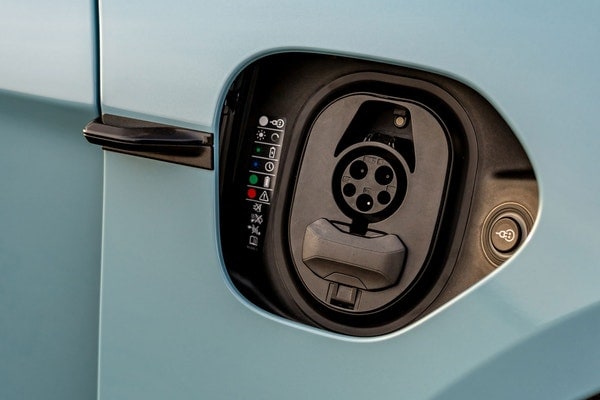
Edmunds Tested: Electric Car Range and Consumption
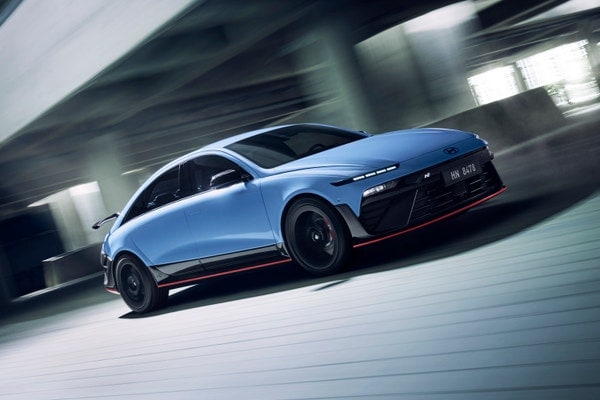
No Surprise: The 2026 Hyundai Ioniq 6 N Is Totally Awesome

2025 Toyota Highlander Hybrid vs. Hyundai Santa Fe Hybrid: Which Three-Row SUV Should You Buy?
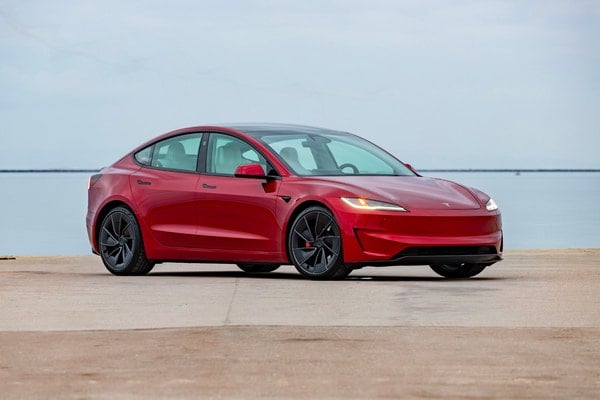
Our 2024 Tesla Model 3 Performance Is an Edmunds U-Drags Assassin
Compare 2015 Hyundai Genesis trim levels
Helpful trims summary and side-by-side comparison chart
Cost to Drive
Monthly estimates based on costs in Iowa
$162/mo for Genesis 3.8
Genesis 3.8
vs
$189/mo
Avg. Large Car
Reliability Ratings by RepairPal
4 out of 5 stars4/5Above Average
#7 out of 48 among Luxury Fullsize Cars
RepairPal Reliability Ratings are based on the actual cost, frequency, and severity of unscheduled repairs and maintenance on make/model data for select 2008-2022 vehicles. The reliability of a specific vehicle may vary depending on its maintenance and driving history, model year, trim, and features.
Cost
$421/yr
vs. $729/yr
for Average Luxury Fullsize Car
for Average Luxury Fullsize Car
Frequency
1.19x/yr
vs. 1.74x/yr
for Average Luxury Fullsize Car
for Average Luxury Fullsize Car
Severity
12.5%
vs. 14.7%
for Average Luxury Fullsize Car
for Average Luxury Fullsize Car
powered by RepairPal
Hyundai Genesis Owner Reviews
Most Helpful Owner Reviews
Trending topics
I can still say Wow - What a Car
5 out of 5 starsJerry Krug, 04/29/2016
2015 Hyundai Genesis 3.8 4dr Sedan (3.8L 6cyl 8A)
My 2015 Genesis is now 10 years old with 106,035K miles and never has had a problem. The car runs and handles like new. The interior has held up very well and paint is still brilliant. Not one component has failed on his car. There are no squeaks or rattles in this very comfortable luxury sedan. Oil changes are at 8K to 10K with Mobil 1 extended life and oil usage is less than 1/2 quart … in 5,000 miles. Best car I have ever owned.
Best kept secret!
5 out of 5 starsScott, 02/28/2016
2015 Hyundai Genesis 5.0 4dr Sedan (5.0L 8cyl 8A)
I've had this car for a year now and all I can say is "AWESOME". We got rid of the BMW and picked up this sweet gem. Wicked fast, super comfy, great tech and tons of compliments. Don't hesitate, buy this beauty...
September 8, 2017 Update:
Still loving this wonderful piece of machinery. Lease ends March 2018. I will be getting another G80 Sport.
March 12, 2018 Update:
Just … turned her in (end of lease). Going to get a new one!
Can't find any flaws. Great ride.
Ahhhhh! It's comfy
5 out of 5 starsEd Pawlowski, 11/02/2015
2015 Hyundai Genesis 3.8 4dr Sedan AWD (3.8L 6cyl 8A)
I drove a 2014 Genesis base model and liked it enough to check out the restyled 2015. Glad I did. Major improvements and it will be looking good for a few more years. Bought one 4 weeks ago. I have 3000 miles in the first month. This weekend, along with another couple, we took a 750 mile round trip. After 300 non-stop miles, I never felt better getting out of the driver's seat. … This was a combination of highway and secondary roads. On the highway, after a few hours I realized just how comfortable the seating and ride are. Very quiet, it is less tiring to drive.
The technology is great. Adaptive cruise control is fantastic. If you are buying a premium car you should have all the options.
Nit picks. I wish the headlights turned on when you turn the wipers on. That is old technology I had on cars 15 years ago and is a simple to do safety feature. I'd like to have remote start on the fob. Using the phone works, but takes too many steps that can be done with a simple button push. The auto high beam is nice on the highway. On secondary roads there were times it would dim the lights as it should have, but the reaction time to go back to brights was a bit slow as you approach a curve.
Update:
It has been 7 months and 12,500 miles. Still very happy with the car and its performance. Over the winter I found that the heated seats are better than any of the ones in my last four cars. Finally had a couple of warm and sunny days to try out the cooling for the seats and this is going to be nice this summer. I will not buy another car unless it has a heated steering wheel too. That touch of luxury is really great on a cold morning.
One morning I was going to work on a snow covered road that is fairly steep. Two cars on the hill sere struggling and sliding, but with the H-Track AWD I just kept chugging along and passed them with no slippage of the wheels at all. I really felt secure going up that hill.
Months later I'm still very happy driving the car with all the comforts, the good sound of the radio and all the gadgets. I'm looking forward to a trip of a few hundred miles this weekend. Fun car to drive. If you buy one, get all the options!
Second update
13 months and 22,500 miles later, I'm still very happy with my Genesis. Now that we have a few cold morning, I can turn the heated steering wheel to the "on" position and start the car with BlueLink remote. On a cold morning it is nice to get into a car with the heater running and the steering wheel warm to the touch. Wish I could turn my seat on too but this helps.
Still very happy overall. Good value, good performance. No problems or repairs.
Edmunds asked that I update my review and I happened to be on vacation at the time. In the past two weeks I drove 3700 miles, including one day at about 700 miles. It was just as I stated before, very comfortable, easy handling. I hope to take a much longer trip and this is the car I'm going to do it inl
So far so good, but one aggravation
5 out of 5 starsJim Orr, 03/07/2015
2015 Hyundai Genesis 3.8 4dr Sedan (3.8L 6cyl 8A)
After driving Buicks & Cadillacs for several years I looked at the Lincoln MK series, drove a Lexus and settled on the Genesis with the Signature package. Traded in a 2011 Buick Lucerne, which I loved. In hindsight I wish I'd sprung for the Tech package with a few more features that I miss. The biggest aggravation is getting the nav system to take voice inputs. Manual inputs work fine … or if I say something she recognizes like "Starbucks" or "Texaco" then it works like a charm. But a voice input street address comes up with some of the weirdest options I've ever seen. Anyone else have the same issue? I have a couple of gripes. This car goes through front turn signal bulbs like Sherman went through Georgia. I've been through at least six. The left one is pretty easy and I can replace it myself. The right one requires removing some structure, so I let a mechanic change it (twice). The auto parts place says a lot of owners have the same problem, as do owners of a couple of VW models. No one seems to know why. The other gripe is that I don't get good tire mileage. I put top end Michelins on and get 30-40 thousand max. The tire man says it's because it's a heavy car on performance tires. I'll probably still buy another Genesis unless something better comes along this fall.
2015 Hyundai Genesis videos
2015 Hyundai Genesis Review
This 2015 Hyundai Genesis video review includes information about its available engines and features, as well as fuel economy, pricing, interior space and competitors.
2015 Genesis Highlights
3.8
| Base MSRP Excludes Destination Fee | $38,000 |
|---|---|
| Engine Type | Gas |
| Combined MPG | 22 MPG |
| Cost to Drive | $162/month |
| Seating | 5 seats |
| Cargo Capacity All Seats In Place | 15.3 cu.ft. |
rear wheel drive | |
| Warranty | 5 years / 60,000 miles |
Safety
Key safety features on the Genesis include:
- Back-up camera
- Blind Spot Monitoring
- Lane Departure Warning
- Alarm
- Tire Pressure Warning
- Stability Control
- Pre-collision safety system
- Post-collision safety system
NHTSA Overall Rating
5 out of 5 starsThe National Highway Transportation Safety Administration offers independent analysis.
- Frontal Barrier Crash RatingOverall5 / 5Driver5 / 5Passenger5 / 5
- Side Crash RatingOverall5 / 5
- Side Barrier RatingOverall5 / 5Driver4 / 5Passenger5 / 5
- Combined Side Barrier & Pole RatingsFront Seat4 / 5Back Seat5 / 5
- RolloverRollover5 / 5Dynamic Test ResultNo TipRisk Of Rollover9.5%
IIHS Rating
The Insurance Institute of Highway Safety uses extensive crash tests to determine car safety.
- Small Overlap Front Driver-Side TestGood
- Small Overlap Front Passenger-Side TestNot Tested
- Moderate Overlap Front Test – OriginalGood
- Moderate Overlap Front Test – UpdatedNot Tested
- Side Impact Test – OriginalGood
- Side Impact Test – UpdatedNot Tested
- Roof Strength TestGood
- Rear Crash Protection / Head RestraintGood
People who viewed this also viewed
| 5.0 average Rating out of 1 reviews. |
| Starting at $42,500 |
| 4.2 average Rating out of 13 reviews. |
| Starting at $58,200 |
| 4.8 average Rating out of 10 reviews. |
| Starting at $42,140 |
Related Used 2015 Hyundai Genesis info
Vehicle reviews of used models
- Nissan Sentra 2020 Review
- Tesla Model X 2020 Review
- Audi R8 2021 Review
- Ford Ecosport 2020 Review
- Volvo XC40 2021 Review
Shop similar models
Shop used vehicles in your area
- Used Genesis G80 2018
- Used Genesis G80 2019
- Used Genesis G80 2021
- Used Hyundai Genesis 2017
- Used Hyundai Genesis 2020
- Used Hyundai Genesis 2023
Popular new car reviews and ratings
- 2024 Ford Bronco Sport
- 2026 BMW M4 News
- 2026 Lexus GX 460 News
- 2025 Porsche Boxster
- New Chevrolet Silverado 3500HD
- 2024 Rolls-Royce Cullinan News
- 2024 Stelvio
- New Dodge Durango
- 2024 Jeep Grand Cherokee L
- 2025 X4 M
Research other models of Genesis
- 2025 Hyundai Kona Electric
- Hyundai Sonata 2025
- 2024 Hyundai Santa Fe Sport
- 2024 Hyundai Tucson
- 2024 Hyundai Palisade
- Hyundai Sonata 2024
- Hyundai Tucson 2024
- Hyundai Elantra 2024
- 2024 Hyundai Elantra N
Research similar vehicles
Other models
- Used Ford F-150 in Effingham, IL 2025
- Used BMW 3-Series in Oceanside, CA 2025
- Used Lincoln Navigator in Barberton, OH 2025
- New Audi Rs-E-Tron-Gt for Sale in Poway, CA
- New BMW X6-M for Sale in Lodi, NJ
- Used Ford Econoline-Cargo in Oklahoma City, OK 2009
- Used Chevrolet Silverado-1500-Ld in Trumbull, CT 2019
- Used Lexus GS-350 in Hot Springs National Park, AR 2020
- New Hyundai Ioniq-9 for Sale in Haddonfield, NJ
- Used Saab 9-4X in Coatesville, PA 2011


